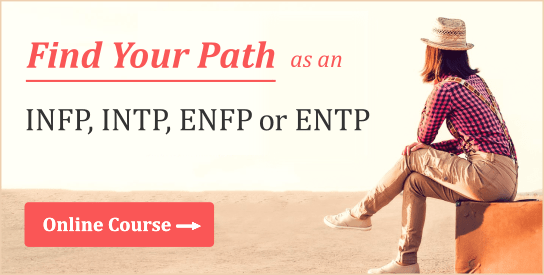
As exemplified in the life and works of Henry David Thoreau, the INFP is the quintessential lover of nature and the outdoors. Not only do INFPs have a special place in their heart for animals, but relish immersing themselves in nature. Some are avid hikers and climbers, while others enjoy more leisurely outdoor activities such as walking, biking, gardening, camping, or photography.
Although INFPs are the most reliably entranced by nature, all the intuitive (N) perceiving (P) types (“NPs” for short) seem to have this proclivity. In this post, we will explore how and why INFP, ENFP, INTP & ENTP types enjoy nature, travel and the outdoors.
The ENFP, as an extraverted type, is less solitary than the INFP. Thus, ENFPs generally prefer the company of friends on their outdoor excursions. Like their INFP counterparts, ENFPs are lovers of animals and the natural world. I’ve also known a number of ENFPs who enjoy gardening and hiking. And because extraverts are less risk averse, some ENFPs may even take interest in “extreme” outdoor sports.
Although thinking (T) types are somewhat less enchanted by the natural world than feelers, both INTP and ENTP types tend to enjoy the outdoors. I’ve known several ENTPs, for instance, who enjoy hunting. I’ve also encountered a number of ENTPs and INTPs who dream about living “off the grid” with all the survivalist accouterments—the latest solar technology, a bountiful garden, etc. These aspirations are often rooted in concerns about the course of civilization, the importance of sustainability, the desire to put their Ne / Ti ingenuity and resourcefulness to good use, etc. Although I’m unsure how many NTPs attempt to actualize this vision, it nonetheless remains a compelling ideal for many (and some NFPs as well).
NP types may also express interest in various forms of communal living. Many are sympathetic to hippy culture or at least to the idea of living sustainably with others. Again, the number of NPs who actually act on these sentiments is probably quite small. More commonly, NPs will satisfy these desires in less extreme ways (e.g., joining a food co-op) or simply allow them to go unrealized.
NPs may also dream about a wandering lifestyle or try to experience it through travelling or hiking. For those with interests in nature as well as culture, travelling allows both itches to be scratched simultaneously.
Nature, Travel & INFP, ENFP, INTP, ENTP Personalities
So why is it that INFP, ENFP, INTP & ENTP types are drawn to nature, travel and the outdoors?
To answer this question, let’s take a closer look at the contributions of the two personality functions shared by these types: Extraverted Intuition (Ne) and Introverted Sensing (Si).
The Role of Extraverted Intuition (Ne)
Perceiving (P) types, by definition, prefer to perceive outwardly. And because Ne is an extraverted function, it perceives broadly and expansively. What Ne conveys to NPs then, is that there’s a vast world out there waiting to be explored. It’s a world conceived as pregnant with possibilities, ripe for new experiences and adventures. This is why being indoors (especially for extended periods during a coronavirus pandemic) can feel stifling and confining to NPs, limited their opportunities for extraverted perception and exploration.
Many NPs have expressed feeling more alive and creative when they’re in motion or en route. Physical movement furnishes a stream of ever-changing surroundings, which is stimulating to Ne. Assuming NPs are in an open and receptive state of mind, even ordinary or conventionally “ugly” things can seem interesting or significant, with each having its own novel context and history. Each new visual point of focus can feel like a photo op, not necessarily because it’s exquisite or beautiful, but simply because it’s unique; there’s something about novelty in its own right that’s meaningful to NPs.
It’s not merely visual novelty that’s important, however. Visual novelty is important largely as a springboard for the imagination—the real source of meaning for NPs. Once the imagination has been aroused, otherwise mundane scenery can become a source of wonderment and amusement. Any particular visual frame can be seen as a miniature world or ecosystem. As Thoreau remarked:
Nature will bear the closest inspection. She invites us to lay our eye level with her smallest leaf, and take an insect view of its plain.
Although this way of engaging with the world can be enhanced with certain types of drugs, most notably psychedelics, it’s a natural feature of Ne which is readily accessible through contemplative walks, be they in natural or urban settings. It’s therefore unfortunate that the convenience and seductiveness of modern technologies have caused many NPs to miss out on the abundance of meaning availed through navigating the world on foot.
While travelling activates many of the same processes, perhaps even more intensely, NPs don’t need exotic trips to experience Ne meaning. If approached with the right mindset, ample meaning can be extracted simply by exploring one’s local landscape; if given the chance, Ne can do a lot with a little. NP artists seem to understand this as well as anyone. They realize that bringing the right mindset to something—an attitude of curiosity and attentiveness—can serve as a portal to a new level of experience and meaning.
In addition to ushering NPs into new imaginative spaces, there’s a more global, even archetypal, aspect of Ne which prompts them to function as “seekers.” It engenders concern regarding the overarching direction and meaning of their lives. From the seeker’s perspective, each new experience has the potential to inform her life path and purpose. In our Finding Your Path course, we outline ways that NP types can clarify their self-understanding and purpose in the world.
If everything can be experienced as something more than what it appears (Ne), in a way that feels surprising and mysterious, and if these experiences are viewed as signposts for a longer journey, then it’s easy to see how Ne might be construed as mystical. The Ne credo might read something like this: “Life has much to reveal to me, so as long as I remain open and receptive to its promptings, my journey will be interesting and meaningful.”
The Role of Introverted Sensing (Si)
Since Ne and Si are always working in tandem in INFP, ENFP, INTP & ENTP types, it’s probably impossible to completely disentangle them experientially. One point of distinction is Ne tends to be future or possibility oriented, while Si orients itself to past experiences or periods. Thus, when NPs are wandering around and something reminds them of the past, perhaps triggering feelings of nostalgia, their Si is probably at play.
Nostalgia is not limited to NPs’ personal history, but can arise from reflecting on the history of nearly anything. As mentioned earlier, when NPs happen upon a particular place or scene, one of the main points of interest is its history. How did it come to be this way? How might it have looked before? What sorts of events might have transpired here? They use their imagination (Ne) to explore historical (Si) questions and possibilities. This is a key way that Ne and Si are connected, which is why many NPs are drawn (more frequently than one might suspect) to certain traditions and pastimes.
Si can also play a prominent role in NPs’ idealism toward nature and the physical body. Considering that humankind evolved within the natural world, it’s easy to see how Ne, in combination with Si, might romanticize our primitive origins. After all, our most extensive and arguably, most formative, historical epoch is not Western civilization, but our time spent as hunter-gatherers. NPs seem more tuned into this fact than other types, contributing to their interest in reconnecting with or “getting back to” nature.
As Thoreau famously scribed during his time at Walden pond, “I went to the woods because I wished to live deliberately, to confront only the essential facts of life.” Many NPs have recapitulated and resonated with Thoreau’s experiences, realizing that the natural world, when approached with interest and care, can be profoundly life-giving and rejuvenating.
If you’re an NP type and would like to better understand your personality, life purpose, career path and more, we encourage you to explore our new online course, Finding Your Path as an INFP, INTP, ENFP or ENTP:
Related Posts:
How INFPs, INTPs, ENFPs & ENTPs Deal with Doubt & Indecision

GeeCee says
Wow. So accurate for this INTP.
snik says
Right on!🌲 I’m definitely most creative when I’m on the move. The pandemic got me out of the car and back on foot which has been invigorating for this INFP, even if only for strolls through my own neighborhood.
A.J. Drenth says
Hello GeeCee & Snik,
Thanks so much for your comments. Glad you resonated with the post!